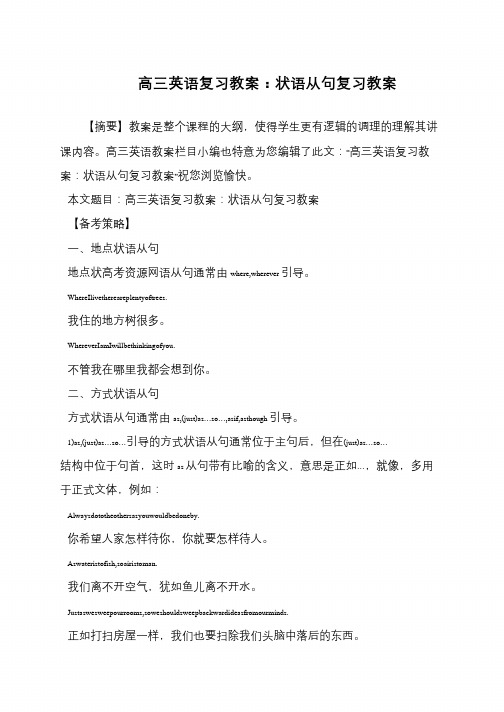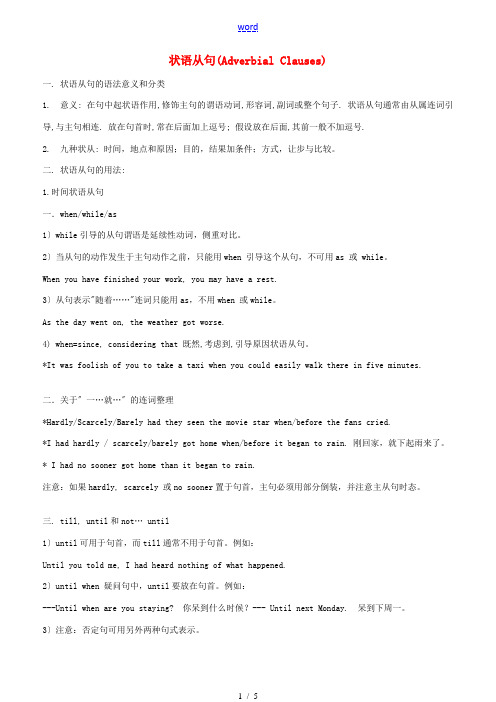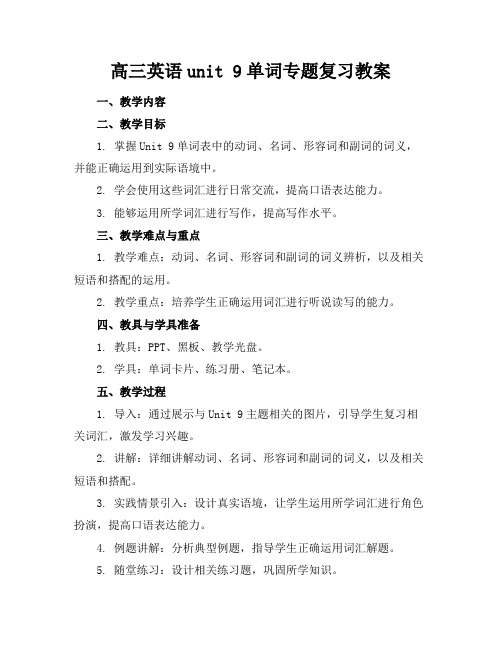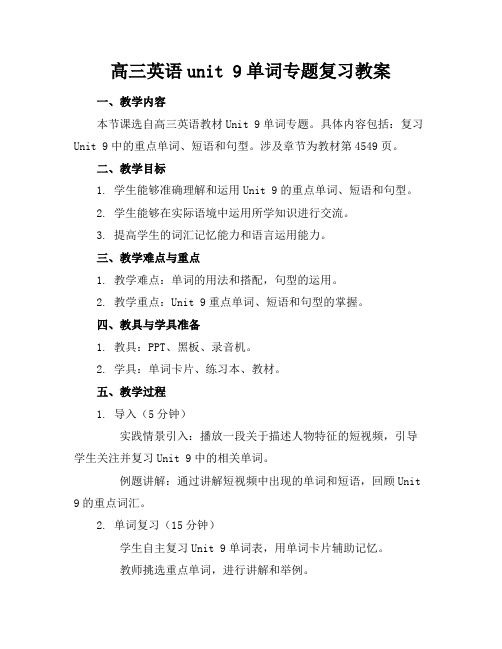江苏省无锡市高三英语总复习教案(艺考生):专题九状语从句教师版
高三英语复习教案:状语从句复习教案

Bettertakemoreclothesincasetheweatheriscold.
五、结果状语从句
结果状语从句常由so…that或such…that引导,掌握这两个句型,首先要
了解so和such与其后的词的搭配规律。
他清了清嗓子,像要说什幺似的。
Thewavesdashedontherocksasifinanger.
波涛冲击着岩石,好像很愤怒。
三、原因状语从句
比较:because,since,as和for
1)because语势最强,用来说明人所不知的原因,回答why提出的问题。当
原因是显而易见的或已为人们所知,就用as或since。
他们完全忽略了这些事实,就仿佛它不存在似的。(与事实相反,谓语用虚
拟语气。)
Helooksasif(asthough)hehadbeenhitbylighting.
他那样子就像被雷击了似的。(与事实相反,谓语用虚拟语气。)
Itlooksasiftheweathermaypickupverysoon.
Theboyissoyoungthathecan'tgotoschool.
Heissuchayoungboythathecan'tgotoschool
六、条件状语从句
连接词主要有if,unless,as/solongas,onconditionthat等。.
if引导的条件句有真实条件句和非真实条件句两种。非真实条件句已在虚
Ididn'tgo,becauseIwasafraid.
Since/Astheweatherissobad,wehavetodelayourjourney.
(word完整版)高三英语复习状语从句教案.docx

状语从句学目: 1 .掌握九种常用的状从句及其常用的接 2.掌握常考点和点一.九种常的状从句/地点/原因/条件/步/果/目的/方式/比状从句二.接,考点与点1.状从句接 : when, while, as, before, after, as soon as, till, until, not⋯until, every time,the first/second⋯/last time, the moment/ minute/ instant/second, immediately, directly,instantly, hardly/ scarcely⋯when, no sooner⋯than考点 1: 1.-Did you remember to give Mary the money you owed her?- Yes. I gave it to her _____ I saw her. A. while B. the moment C. suddenly D. once2. I thought her nice and honest ______ I met her.A. first timeB. for the first timeC. the first timeD. by the first time3. ______ entered the office when he realized that he had forgotten his report.A. He hardly hadB. Had he hardlyC. Hardly had heD. Hardly he had4.加一个 the day的例句: 1)一些,如the moment, the minute,the instant,immediately,directly,instantly, hardly ⋯when, scarcely ⋯when, no sooner ⋯than等也可引状从句,相当于________________ 意思。
高三英语一轮复习 专题《状语从句》教案-人教版高三全册英语教案

状语从句(Adverbial Clauses)一. 状语从句的语法意义和分类1. 意义: 在句中起状语作用,修饰主句的谓语动词,形容词,副词或整个句子. 状语从句通常由从属连词引导,与主句相连. 放在句首时,常在后面加上逗号; 假设放在后面,其前一般不加逗号.2. 九种状从: 时间,地点和原因;目的,结果加条件;方式,让步与比较。
二. 状语从句的用法:1.时间状语从句一.when/while/as1〕while引导的从句谓语是延续性动词,侧重对比。
2〕当从句的动作发生于主句动作之前,只能用when 引导这个从句,不可用as 或 while。
When you have finished your work, you may have a rest.3〕从句表示"随着……"连词只能用as,不用when 或while。
As the day went on, the weather got worse.4) when=since, considering that 既然,考虑到,引导原因状语从句。
*It was foolish of you to take a taxi when you could easily walk there in five minutes.二.关于〞一…就…〞的连词整理*Hardly/Scarcely/Barely had they seen the movie star when/before the fans cried.*I had hardly / scarcely/barely got home when/before it began to rain. 刚回家,就下起雨来了。
* I had no sooner got home than it began to rain.注意:如果hardly, scarcely 或no sooner置于句首,主句必须用部分倒装,并注意主从句时态。
江苏省无锡市高三英语总复习教案(艺考生):巩固练习 学生版

单项选择题训练21. — Can I help you with it?— I appreciate your _____ , but I can manage it myself.A. adviceB. questionC. offerD. idea22. After the flooding, people were suffering in that area,_______ urgently needed clean water, medicine and shelter to survive.A. whichB. whoC. whereD. what23. Sophia waited for a reply, but ____ came.A. eitherB. anotherC. neitherD. none24. ---Don't worry, Mum. The doctor said it was only the flu.---_______! I'll tell Dad there's nothing serious.A. What a reliefB. CongratulationsC. How surprisingD. I'm so sorry25. There is little doubt in your mind that he is innocent, _______________?A. is thereB. isn't thereC. is heD. isn't he26. — OK, I've had enough of it. I give up.—You can't _____ your responsibilities.A. run off withB. run up againstC. run out ofD. run away from27. The notice came around two in the afternoon the meeting would be postponed.A. whenB. thatC. whetherD. how【试题延伸】(2011·天津)Modern science has given clear evidence ____________smoking can lead to many diseases.)]28. Days later, my brother called to say he was all right, but say where he was.A. mustn'tB. shouldn'tC. wouldn'tD. mightn't29. — Thank God you're safe!—I stepped back, just ____ to avoid the racing car.A. in timeB. in caseC. in needD. in vain30. One's life has value _ o ne brings value to the life of others.A. so thatB. no matter howC. as long asD. except that31. ____ an important decision more on emotion than on reason, you will regret it sooner or later.A. BasedB. BasingC. BaseD. To base【试题延伸】(2011·辽宁). ____________around the fire, the tourists danced with the local people.32. The manager is said to have arrived back from Paris where he________ some European partners.A. would meetB. is meetingC. meetsD. had met33. —Honey, the cats stuck in the tree. Can you turn off the TV and get a ladder…?—Oh, it jumped off. ____ .A. Never mindB. All rightC. No problemD. Take care34. The president hopes that the people will be better off when he quits than when he________.A. has startedB. startsC. startedD. will start35. — Happy birthday!—Thank you! It’s the best present I __ for.A. should have wishedB. must have wishedC. may have wishedD. could have wished阅读理解I made up my mind to drive to South Carolina to meet my friends in my used car. Though I had only been there once 1 and did not know the 2 very well. I was on the 3 after I had made some inquiries (询问).At Ashvelle, there was a crossroad where I could go on along the main road or I could take a short cut. The short cut was to 4 several hills and was dangerous ,I hesitated (犹豫)for a little while and then chose the main road, for I wanted to be 5 .Something strange happened after I drove a long 6 and found it was not the correct road that I wanted to 7, but the hilly road I decided to avoid .I realized that it was at the 8 that I had made the 9 mistake. “What shall I do?” I asked myself .If I went back to take that road again, i t would be very late by the time I got to Columbia. Thin it 10 , I decided to go on. “If 11 people can go along this road, why can’t I?” I 12 myselfThe short cut, to my surprise ,was not that 13 .In fact, it was only a very peaceful country road, 14 up and down two low 15 .There was 16 traffic. On both sides of the road, you could see trees, wild flowers, and 17 with cows and horses. My fear was 18 with the wind.Listening to the beautiful country music over my car stereo (立体声), I drove on and 19 the scenery(景色)which was so quiet and so natural .Even my used car forgot to give me 20 .It was just in this light heartedness that I arrived at my destination. My friends, after they heard what had happened to me, all said it sounded like an adventure.1. A. before B. ago C. already D. still2. A. town B. country C. friends D. way3. A. train B. car C. highway D .phone4. A. have B. go C. ride D. cross5. A. safe B. dangerous C. fast D. slow6. A. moment B. way C. road D. day7. A. come B. leave C. take D. drive8. A. crossroad B. corner C. station D. beginning9. A. direction B. road C. disappointed D. interesting10. A. about B. over C. of D. up11. A. another B. the other C. other D. others12. A. asked B. forced C. encouraged D. told13. A. far B. safe C. dangerous D. dirty14. A. going B. coming C. driving D. walking15. A. lands B. cars C. farms D. hills16. A. heavy B. little C. few D. light17. A. farms B. trucks C. houses D. villages18. A. together B. gone C. covered D. coming19. A. looked B. liked C. enjoyed D. found20. A. happiness B. scenery C. joys D. problems。
高三英语unit9单词专题复习教案

高三英语unit 9单词专题复习教案一、教学内容二、教学目标1. 掌握Unit 9单词表中的动词、名词、形容词和副词的词义,并能正确运用到实际语境中。
2. 学会使用这些词汇进行日常交流,提高口语表达能力。
3. 能够运用所学词汇进行写作,提高写作水平。
三、教学难点与重点1. 教学难点:动词、名词、形容词和副词的词义辨析,以及相关短语和搭配的运用。
2. 教学重点:培养学生正确运用词汇进行听说读写的能力。
四、教具与学具准备1. 教具:PPT、黑板、教学光盘。
2. 学具:单词卡片、练习册、笔记本。
五、教学过程1. 导入:通过展示与Unit 9主题相关的图片,引导学生复习相关词汇,激发学习兴趣。
2. 讲解:详细讲解动词、名词、形容词和副词的词义,以及相关短语和搭配。
3. 实践情景引入:设计真实语境,让学生运用所学词汇进行角色扮演,提高口语表达能力。
4. 例题讲解:分析典型例题,指导学生正确运用词汇解题。
5. 随堂练习:设计相关练习题,巩固所学知识。
六、板书设计1. 动词、名词、形容词和副词的词义辨析。
2. 常用短语和搭配。
3. 口语和写作实践。
七、作业设计1. 作业题目:根据本节课所学内容,编写一篇短文,运用至少10个Unit 9词汇。
2. 答案:略。
八、课后反思及拓展延伸2. 拓展延伸:推荐与Unit 9主题相关的阅读材料和听力练习,帮助学生巩固和拓展所学知识。
重点和难点解析1. 教学内容的详细讲解2. 教学目标的设定与实现3. 教学难点与重点的突出4. 教学过程的实践情景引入和例题讲解5. 板书设计的关键信息展示6. 作业设计的针对性和拓展延伸的深度一、教学内容的详细讲解在教学内容部分,教师应重点关注动词、名词、形容词和副词的词义辨析。
这要求教师在备课阶段对每个词汇的用法、搭配及其在不同语境中的应用有深入的了解。
讲解时,应通过例句、同义词和反义词的对比,以及词汇在不同情境下的运用,帮助学生构建词汇网络,强化记忆。
高三英语unit9单词专题复习教案

高三英语unit 9单词专题复习教案一、教学内容本节课选自高三英语教材Unit 9单词专题。
具体内容包括:复习Unit 9中的重点单词、短语和句型。
涉及章节为教材第4549页。
二、教学目标1. 学生能够准确理解和运用Unit 9的重点单词、短语和句型。
2. 学生能够在实际语境中运用所学知识进行交流。
3. 提高学生的词汇记忆能力和语言运用能力。
三、教学难点与重点1. 教学难点:单词的用法和搭配,句型的运用。
2. 教学重点:Unit 9重点单词、短语和句型的掌握。
四、教具与学具准备1. 教具:PPT、黑板、录音机。
2. 学具:单词卡片、练习本、教材。
五、教学过程1. 导入(5分钟)实践情景引入:播放一段关于描述人物特征的短视频,引导学生关注并复习Unit 9中的相关单词。
例题讲解:通过讲解短视频中出现的单词和短语,回顾Unit 9的重点词汇。
2. 单词复习(15分钟)学生自主复习Unit 9单词表,用单词卡片辅助记忆。
教师挑选重点单词,进行讲解和举例。
3. 句型复习(10分钟)教师展示Unit 9重点句型,引导学生进行模仿和运用。
学生进行随堂练习,巩固所学句型。
4. 小组活动(10分钟)学生分组,运用Unit 9所学单词和句型进行角色扮演,描述各自喜欢的明星或朋友。
教师巡回指导,纠正错误,给予鼓励。
学生分享学习心得,互相借鉴。
六、板书设计1. Unit 9重点单词和短语。
2. Unit 9重点句型。
3. 课堂练习和拓展内容。
七、作业设计1. 作业题目:根据Unit 9所学单词和句型,写一篇描述朋友的短文。
答案:略。
2. 作业题目:用Unit 9所学单词和句型,编写一段关于描述梦想中的旅行的对话。
答案:略。
八、课后反思及拓展延伸1. 反思:关注学生在课堂上的参与度,针对不同学生的学习情况,调整教学方法和节奏。
2. 拓展延伸:鼓励学生在课后继续积累词汇,关注词汇在实际语境中的应用。
推荐阅读与Unit 9主题相关的文章,提高英语素养。
江苏省无锡市高三英语总复习教案(艺考生):专题七定语从句教师版
【知识要点】一、定语从句的意义形容词性从句一般称为定语从句,在句子中起定语作用,修饰一个名词或代词,有时可修饰一个句子。
被定语从句修饰的词叫先行词。
定语从句的位置:一般置于先行词之后,由关系代词和关系副词引导。
二、关系词的用法引导定语从句的关系代词有which,that,who,whom,whose。
关系副词有when,where,why等。
关系代词和关系副词不仅有连接先行词和从句的作用,而且在从句中担当一个句子成分。
1.关系代词的用法:1)由who引导的定语从句关系代词who只能指人,在从句中作主语或宾语。
如:教师是传授知识的人。
(关系代词在从句中作主语)能够做此工作的人将获得1000美元。
(关系代词who在从句中作主语)2)由whom引导的定语从句关系代词whom只能指人,是who的宾格,在从句中作宾语,在口语中常常省略。
如:你在街上碰到的那个人是我父亲。
(关系代词who在从句中作宾语,可以省略)昨天和你谈话的那位妇女后天来这儿。
(关系代词whom在从句中作宾语,可以省略)3)由that引导的定语从句关系代词that在从句中既可以作主语,又可作宾语;既可指人,又可指物。
如:她就是常常来这儿的那个妇女。
(关系代词that在从句中作主语,指人)桌子上的那本书是我祖父写的。
(关系代词that在从句中作主语,指物。
此句中的that可以用which 替换)Is there anything that I can do for you? 我能为你做点什么呢?(关系代词that在从句中作宾语,指物。
此句中的that不能用which替换)The passenger and the suitcases that were still waiting had to be transferred to another plane. 仍在等待的乘客和行李只得改乘另一架飞机。
(这句的关系代词that不能用which替换,因为它在此句中既指人又指物4)由which引导的定语从句关系代词which一般指物,在从句中可作主语,也可以作宾语。
高考英语无锡状语从句知识点知识点总复习附答案
高考英语无锡状语从句知识点知识点总复习附答案一、选择题1.______ this approach is effective in losing weight, it is not as beneficial as keeping a balanced diet.A.Once B.While C.Unless D.Until2.Steve Jobs is a key figure in the computer world _____ he has had a great influence on modern life and technology.A.on condition that B.in caseC.in that D.as long as3.A Chinese company has created a new facial recognition system that can identify people______ they are wearing masks.A.provided that B.in case C.as though D.even if4.All bad things must come to________end, ________ terrible an experience is.A.the; whatever B.an; however C./; how D.a; what5.The basic model function of the hero seems to remain constant, ______ the precise qualities of hero may vary over time.A.in case B.as if C.so that D.even though6.I will try my best to get lo the station ahead of time ____ I have to walk all the way there. A.so that B.as though C.even if D.in case7._____ I once made some mistakes, I won’t spend a moment of the future regretting what might have been.A.Until B.While C.Unless D.Because8.Do not make complaints about being left out___you shy away from sharing your joys and sorrow with others.A.when B.unless C.once D.until9.I was so proud _______ my team won the ice hockey competition. It made me feel like I could achieve anything.A.while B.when C.before D.until10.The young lady rushed into the room _____ she heard the noise.A.right away B.at once C.immediately D.at the moment 11._____ you may meet, you should face the challenge bravely.A.However a serious problem B.What a serious problemC.However serious a problem D.What serious a problem12.- Have you known each other for long?- Not really. ________ we started to work in this school.A.Just after B.Just when C.Ever since D.Just before13.I can’t figure out why some foreigners must go out_______staying at home is the safest way during the outbreak of the virus.A.until B.before C.unless D.when14.—Do you think the weather will be fine this spring?—No, we are fortunate. The weatherman forecasts there will be several sand storms.A.if B.as C.though D.unless 15.Mother Teresa _______ great contribution to the world peace, _______ she was awarded the Nobel Price in 1979.A.might have made, because B.must have made, forC.could have make, since D.should have make, as16._______ hip-hop is popular with youngsters, I’m still not accustomed _______ it.A.As, to appreciating B.Although, to appreciateC.Even though, to appreciating D.While, to appreciate17.It won't be long _our summer vacation begins, but my vacation plans are still up in the air. A.when B.until C.that D.before18.Peter had been puzzled over the problem for over an hour___________ all at once the solution flashed across his mind.A.when B.while C.then D.as19.—Why do people like pop music? I hate it so much.—______ it is not your style, that doesn’t mean it is bad.A.Only if B.Even though C.Nov that D.In case20._____ never easy, innovation is absolutely possible with adequate training and continuous practice.A.When B.As C.Since D.While 21.Incredible ________ it was, it was true.A.although B.though C.even though D.despite22.My parents live in a small village. They always keep candles in the house _____ there is a power out.A.if B.unlessC.in case D.so that23.The car in front of us came to________ we almost hit it.A.such a sudden stop that B.a stop so sudden thatC.such a sudden stop as D.so sudden a stop as24.One Friday, we were packing to leave for a weekend away ________ my daughter heard cries for help.A.after B.while C.since D.when25.______ you lose in life, don’t lose faith and hope, with which you can live a happy life and achieve your goals.A.Whenever B.Wherever C.Whatever D.Whoever【参考答案】***试卷处理标记,请不要删除一、选择题1.B解析:B【解析】【分析】【详解】考查状语从句连词。
高考英语语法状语从句教案
状语从句【专题要点】状语从句考点概览:1.when, while, as引导时间状语从句的区别;2.名词词组the minute, the moment, the first time, each time, any time等用作连词,引导时间状语;3.before,和since引导时间状语从句的用法以及常见的几个句型;4.till和until的用法;5.although, though, as以及even if, even though引导让步状语从句的用法;6.结果状语从句中“so ----that”与“such---that”的区别;7.条件状语从句unless, providing/provided, suppose/supposing等引导词的用法;8.“疑问词+ever”和“no matter+疑问词”引导从句的用法【考纲要求】考纲要求在复习状语从句中掌握如下几点:1.全面掌握状语从句的九大类别;2.根据历年高考试题,对状语从句的考点要进行全面的归纳,在九大类别中的考查热点中,重点把握在引导时间、地点、条件、让步、比较、原因状语从句的连词运用上;3.熟练运用出现频率较高让步状语从句和原因状语从句;4.做好易混词的辨析如:as, when, while等,时间状语从句因为连接词容易出现在一些常用结构里也经常出现;5. 掌握状语从句中的时态、语态、语气、省略;6.与其它从句、句型结合起来分析、辨析【教法指引】状语从句是是中学的重点语法项目,也是高考常考的语法项目之一,分析近五年来的高考题几乎每年各省市都考查到它。
根据其用途,状语从句在复合句中作状语,修饰主句中的谓语动词、副词、形容词或整个句子。
可分为时间、原因、地点、目的、结果、条件、让步、比较及方式等类型,可以分为九大类。
不同的状语从句使用不同的连接词,有时同一个连接词可连接不同的状语从句,表示不同的意义因此教师在引导学生备考复习的过程中应该做到:1 熟悉这九大类别的状语从句的不同的连接词的意义和用法2准确判断主从句的逻辑关系,同时还要注意区分词义相近的连词、介词和副词3 解题的过程中要注意时态、语态、语气、语序的统一4加强各个类别的状语从句的的分析和理解练习【知识网络】状语从句的用法由从句担任的状语,在句子中可修饰谓语(或其它动词)、形容词、副词或是整个句子,它可以用来表示时间、地点、原因、目的、结果、条件、方式、比较、让步等状语从句是一较大的语法项目,也是近几年高考题中常见的一个重要试点。
无锡市2019年高三英语一轮复习(艺考生):专题九状语从句教师版
【知识要点】 定义:用来充当状语的句子称为状语从句。
功能:它主要用于修饰句子中的谓语动词、形容词或副词等,有时修饰整个句子。
位置:状语从句的位置较活:可以放在主句之前,用逗号与主句隔开;也可以放在主句之后,一般不用逗号。
由于它是从各个方面来修饰、说明谓语动词发生时的各种情况,所以常见的状语从句有九种之多。
各种不同的状语从句所使用的关系词也各不相同。
一、时间状语从句引导时间状语从句的从属连词有很多,现将分类用法如下:注: 1)when 还可作并列连词,其意义为“那时,这时”,相当于and at this/that time 。
常用于下列句式: sb.was doing sth.when...某人正在干某事就在这时……sb.was about to/ going to do sth.when...某人正打算干某事就在这时……sb. has just done some sth.when...某人刚干了某事就在这时……2)when 还表示原因“既然”。
如:It was foolish of you to take a taxi when you could easily walk here in five minutes.既然你可以步行五分钟就能到这儿,坐出租车来真是愚蠢。
3)while 作为并列连词,意为“而,却”,表示对比。
He likes pop music ,while I am fond of folk music.他喜欢流行音乐,而我却喜欢民间音乐。
4)如果主句表示的是短暂动作,而从句用延续性动词的进行时态表示在一段时间内正在进行的动作时,when ,while 与as 可互换使用。
如:When/While/As I was walking down the street ,I came across an old friend of mine.我在街道上走的时候,见到了我的一个老朋友。
- 1、下载文档前请自行甄别文档内容的完整性,平台不提供额外的编辑、内容补充、找答案等附加服务。
- 2、"仅部分预览"的文档,不可在线预览部分如存在完整性等问题,可反馈申请退款(可完整预览的文档不适用该条件!)。
- 3、如文档侵犯您的权益,请联系客服反馈,我们会尽快为您处理(人工客服工作时间:9:00-18:30)。
【知识要点】定义:用来充当状语的句子称为状语从句。
功能:它主要用于修饰句子中的谓语动词、形容词或副词等,有时修饰整个句子。
位置:状语从句的位置较活:可以放在主句之前,用逗号与主句隔开;也可以放在主句之后,一般不用逗号。
由于它是从各个方面来修饰、说明谓语动词发生时的各种情况,所以常见的状语从句有九种之多。
各种不同的状语从句所使用的关系词也各不相同。
一、时间状语从句引导时间状语从句的从属连词有很多,现将分类用法如下:1.从属连词when,while与as连词用法谓语动词意义例句when从句的动作和主句的动作可以同时发生,也可以先后发生。
可以指时间的某个点,也指一段时间。
延续性动词非延续性动词当……时候When they heardthe news,they alljumped with joy.I owed Jack $ 100when I was in London.as 从句的动作与主句的动作同时发生。
可以指时间的某个点,也指一段时间。
延续性动词非延续性动词随着……一边……;一边……当……时候The students sangas they walked.As he stood up,hedropped the glass,breaking it into pieces.while 从句的动作与主句的动作同时发生,强调一段时间。
从句中常用过去进行时态或一般过去时态。
延续性动词当……时候在……期间While I was reading,he came in.I made some foreignfriends while I was inLondon.注:1)when还可作并列连词,其意义为“那时,这时”,相当于and at this/that time。
常用于下列句式:sb. was doing sth. when...某人正在干某事就在这时……sb. was about to/ going to do sth. when...某人正打算干某事就在这时……sb. has just done some sth. when...某人刚干了某事就在这时……2)when还表示原因“既然”。
如:It was foolish of you to take a taxi when you could easily walk here in five minutes.既然你可以步行五分钟就能到这儿,坐出租车来真是愚蠢。
3)while作为并列连词,意为“而,却”,表示对比。
He likes pop music,while I am fond of folk music.他喜欢流行音乐,而我却喜欢民间音乐。
4)如果主句表示的是短暂动作,而从句用延续性动词的进行时态表示在一段时间内正在进行的动作时,when,while与as可互换使用。
如:When/While/As I was walking down the street,I came across an old friend of mine.我在街道上走的时候,见到了我的一个老朋友。
2.从属连词:as soon as,immediately,directly,the moment,the minute,no sooner...than..., hardly/scarcely... when...,once这些从属连词引导的从句都表示从句的动作一发生,主句的动作随即就发生,意为“一……就……”。
从句中用一般时态代替将来时态。
如:Once you remember it,you’ll never forget it.一旦你记住它,就永远不会忘记。
The moment I heard the voice,I knew father was coming.我一听到声音,就知道是父亲来了。
No sooner had we arrived at the station than the train left.我们一到达车站,车就开了。
注:no sooner...than...; hardly/scarcely...when...这一结构的时态搭配:no sooner与hardly/scarcely引导的主句谓语动词应用过去完成时,而than与when的从句中谓语应用一般过去时。
此外,当把no sooner 和hardly/scarcely提到句首时,应用倒装语序。
我一到家,天就开始下雨了。
I had hardly got home when it began to rain.→Hardly had I got home when it began to rain.3.till,until (not...until/till...直到……才)连词用法动词意义例句till/until主语和从句都主句的动词一直到……为止I’ll stay here用肯定式为连续性动词till/until the rainstops.not...till/until 主句用否定形式,从句用肯定形式主句的动词为非连续性动词直到……才He didn’t gohome till/until hefinished hishomework.注:1) till不可以置于句首,而until可以置于句首。
如:Until you told me I had no idea of it.直到你告诉我,我对此事才有所了解。
2)如果将“not until...”结构放在句首,那么主句要写成倒装句。
如:Not until we pointed out their fault to them did they realize it.直到我们向他们指出了他们的错误,他们才意识到。
4.every time,each time,next time等名词短语用来引导时间状语从句,表示“每当……,每次……,下次……”。
如:Every/Each time I was in trouble,he would come to help me out.每次我遇到麻烦,他总会来帮我。
Next time you come,do remember to bring your son here.下次你来的时候,一定要记得把你儿子带来。
5.从属连词:before(在……之前),after(在……之后),since(自从……以来)。
如:Please remember to turn off all the lights before you leave the classroom.离开教室前,请记得把所有的灯都关上。
注:1)上述三个连词,既是从属连词,也是介词。
2)若表达“还未……就……”“不到……就……”“……才……”“趁……,还没来得及”时,需用连词before。
如:We had sailed four days and four nights before we saw land.我们航行了四天四夜才看到陆地。
We hadn’t run a mile before he fe lt tired.我们跑了还不到一英里他就累了。
Please write it down before you forget it.趁你现在没忘把它记下来。
二、地点状语从句1.常用的引导词有where(在……地方),wherever(无论在什么地方)等。
指具体地点时,从句可用于主句之前或之后,表示抽象条件时,从句须放在主句之前。
如:The university graduates are determined to go wherever they are needed most.那些大学毕业生们决心去最需要他们的地方。
They are planting trees where there is plenty of water and sunlight.他们在阳光雨水充分的地方植树。
Where there is a will, there is a way.有志者事竟成。
2.注意区分where引导的定语从句与状语从句。
你最好在有问题的地方作个标记。
You’d better make a mark where you have any questions.(状语从句)You’d better make a mark at the place where you have any questions.(定语从句)三、条件状语从句1.常用的引导词有if(如果,假如),unless(除非,要不……就不),as long as(只要),so long as(只要),provided (that)(只要),suppose/supposing(假设),on condition (that)(如果)等。
如:I may not come to see you recently unless I can complete the project ahead of time.除非我能提前完成那个项目,否则我最近不会来看你了。
We can surely attain our goal as long as we are united as one.只要我们团结一致,我们肯定能实现我们的目标。
What shall we do if we can not get the necessary data?如果我们弄不到必要的数据,我们怎么办?They promised to let us have a meeting in their office on condition(that)we could keep it clean.如果我们能保持清洁,他们答应让我们在他们的办公室里开会。
2.要点提示:1)在表示条件的状语从句中,既可以用直陈语气作“真实条件句”,也可以用虚拟语气作“非真实条件句”。
至于把句子作成哪一种条件句,要依照“有关语法规则”和“表达意思的需要”而定。
2)用unless引导条件状语从句时,要注意这个连词自身在意义上是否定的:unless=if...not...。
因此,我们在逻辑上要注意:英文句子的用法和中文句子的译文。
特别是当主句是否定句时,逻辑上的意思就成了“否定之否定而表示肯定”的情况了。
如:I will not go to their party unless I am invited.这个句子的实际意义等于:I will not go to their party if I am not invited.这就是说,“我不去参加聚会”的条件是“我没有受到邀请”。
“不去”与“没有受到邀请”就构成了“否定之否定而表示肯定”的情况了。
